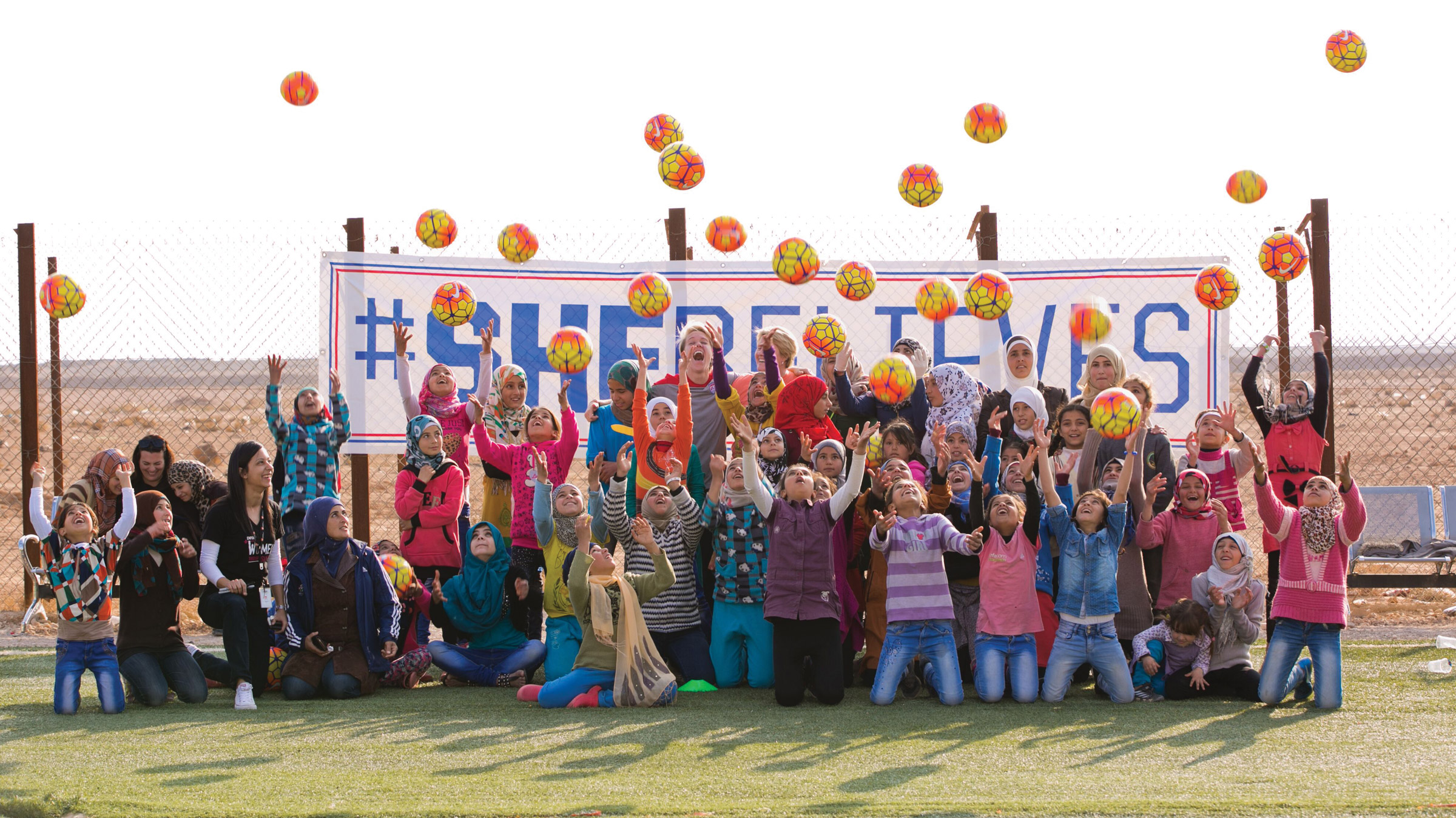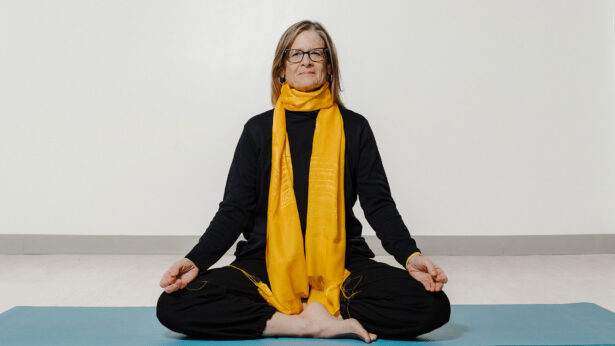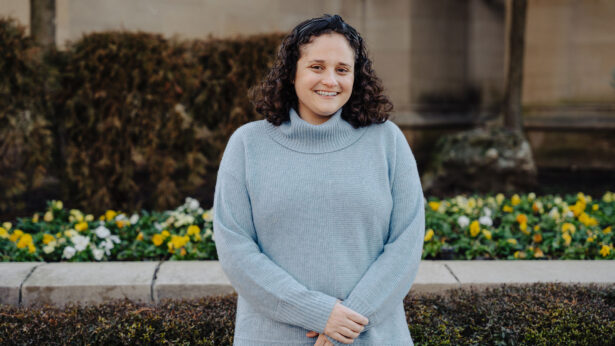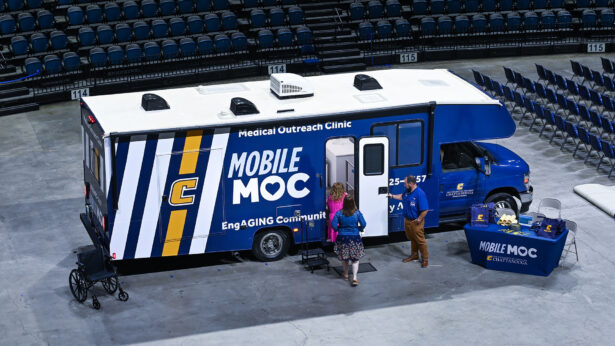By Brian Canever
The suffering was hard for Dima Alardah to witness. She had arrived in Mosul, Iraq, in February 2018—only seven months after the Iraqi military had retaken the city from ISIS following brutal fighting that claimed the lives of thousands of civilians.
Now, Alardah, a Jordanian who organized youth programs for the Norwegian Refugee Council, watched as hundreds of thousands of residents returned home to a city destroyed by warfare.
“There was no infrastructure,” Alardah says. “No schools, no bridges and no houses. People were sick from the pollution in the air and the water. Everywhere you walked there were explosive devices left in the rubble.”
But Alardah never lost faith.
“As long as there is sport,” she says, “there is hope.”
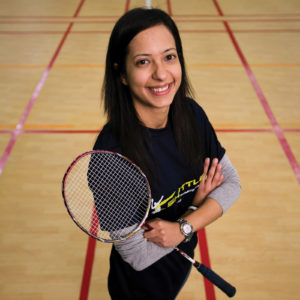
Less than 200 miles from where Alardah stood, another woman had whispered the same message to herself a decade earlier: Sarah Hillyer (Knoxville ’10), director of the Center for Sport, Peace, and Society (CSPS) in UT Knoxville’s College of Education, Health, and Human Sciences.
Hillyer, a recipient of a 2019 UT President’s Award, repeated the statement hundreds of times since 2007, when she first arrived to Sulaymaniyah, a Kurdish city in northern Iraq where she spent time developing and growing women’s basketball. Much like Mosul, residents of the city are intimately familiar with the devastations of war. During the late 1980s, the Iraqi government launched a genocide campaign that led to the deaths of between 50,000 and 182,000 people, according to reports from human rights agencies and Kurdish government officials. Halabja, less than two hours by car from the gym where Hillyer taught girls to play basketball, was the site of a chemical attack that killed or injured more than 10,000 civilians.
Like Alardah, however, when Hillyer watched people step onto the court, she knew something special was about to happen.
“Sport is perhaps the most powerful tool to promote equality and inclusion around the world,” Hillyer says. “I believe it because I’ve seen it.” During a nearly 30-year career, Hillyer has traveled to more than two dozen countries spreading her message. She has led basketball and softball camps for refugees, religious and ethnic minorities, people with disabilities and, especially, girls and women in places like Morocco, Iran and China. Her work has always been joined by a common belief: Where people are excluded from sports, they are usually excluded from everything else, too.
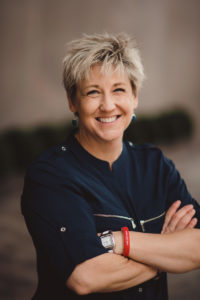
Since co-founding the CSPS with former UT professor Ashleigh Huffman in 2012, Hillyer and the center have been awarded $9 million from the U.S. Department of State to train leaders from around the world on how to empower girls, women and people with disabilities through sports.
In 2014, Hillyer and Alardah’s paths crossed when Alardah was selected to participate in a five-week exchange program funded by the U.S. government and implemented by the CSPS. As part of the Global Sports Mentoring Program, Alardah worked with the CSPS and a sponsoring mentor organization, the Professional Golfers’ Association of America, to learn about how sport could be used to spur development, promote peace and empower marginalized groups.
Since then, Alardah and more than 150 sports leaders from 77 countries who have gone through the program have directly impacted the lives of more than 350,000 people around the world.
Four years ago, Hillyer and a delegation from the United States, including former U.S. women’s soccer national team players Lori Lindsey and Mary Harvey, stood together with Alardah in Jordan. The group hosted workshops and soccer clinics in the Zaatari and Mrajeeb Al Food refugee camps, where Alardah worked before she left for Iraq. After 10 months in Mosul, Alardah left for Myanmar in February. There she manages a program to bring together youth from the Rohinga Muslim and Rakhine Buddhist communities devastated by sectarian violence.
“Sport is like a bridge,” she says. “It brings people together. It’s a language that everyone can speak and understand.”
From Grassroots to Global
For most of her career, Hillyer organized her work through a grassroots organization, Sport 4 Peace. Through it, she mobilized friends and former athletes to work with local coaches and overseas partners. After earning her Ph.D. in sport sociology from UT Knoxville, she left for a post-doctoral fellowship at Georgetown University, where she mapped how sport is used for peacebuilding around the world. Then she received the call from UT Graduate School Dean Dixie Thompson, then department head for kinesiology, recreation, and sport studies, that their paperwork to start a center had been approved.
Bob Rider, who recently retired as dean of the College of Education, Health, and Human Sciences, saw the center’s potential for outreach and community service and was a key advocate for establishing it at UT.
“The impetus for starting the CSPS was to take advantage of the expertise and experience Dr. Hillyer gained from her previous international work,” Rider says. “I knew immediately that, under her leadership, the CSPS would maximize the college’s international outreach and engagement mission, both locally and globally.”
Seven years later, it has organized more than a dozen exchanges for the U.S. government and served as a founding partner of the VOLeaders Academy, a student-athlete leadership development program housed in UT Athletics. In 2018, its work with the Global Sports Mentoring Program was awarded both an ESPN Sports Humanitarian Award for helping the disadvantaged through sport and a Peace and Sport award for diplomatic action.
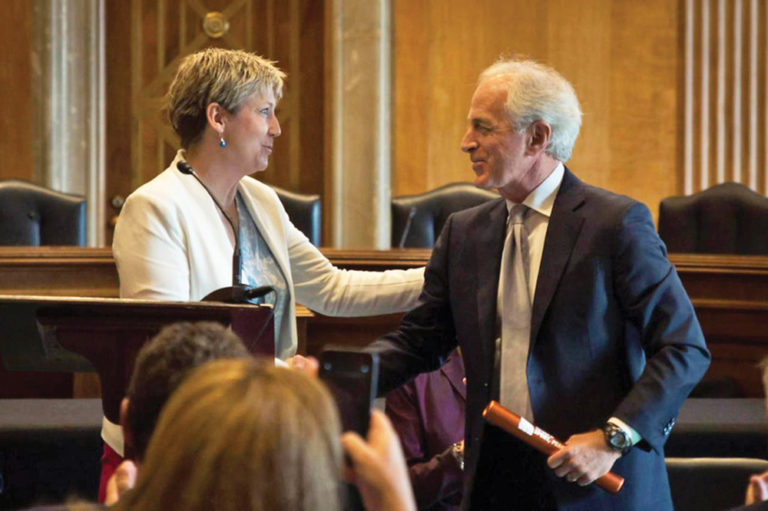
In 2018, when former U.S. Sen. Bob Corker was awarded the Walter Roberts Award by George Washington University’s Institute for Public Diplomacy and Public Communication, he presented the accompanying $5,000 endowment to Hillyer, asking her to continue to support the work of UT to make a global impact through sports.
Aside from bringing leaders like Alardah to the U.S., the center also has sent its staff overseas, where they’ve worked with Syrian refugees in Jordan, disabled youth in Brazil and female softball and basketball players in Mexico.
“It’s a very unique skillset the center offers,” Trina Bolton, program officer for the U.S. Department of State’s Sports Diplomacy division, says. “Its ability to support our people-to-people exchanges at the grassroots level is very strong.”
On the ground, the CSPS organizes workshops, runs activities inside the classroom and on sports fields, and meets with U.S. embassy and foreign government officials who are at the decision-making table influencing how communities are supported.
“The team brings policy and cultural sensitivity, commitment and genuine sincerity to supporting international delegates now and for years afterward,” Bolton says.
The center’s philosophy is simple: Expose people to new ideas of how to use sport for social change and equip them to carry out these ideas.
“We cannot reach every person we want to impact,” Hillyer says. “Empowering leaders who are rooted in their communities and embedded with the populations they want to serve is the heartbeat of our work. We provide a small group with the tools to multiply their impact further and wider.”
One of these leaders, Olga Dolinina, participated in the same 2014 exchange as Alardah.
Dolinina was marketing and public relations director for Hockey Club Donbass in eastern Ukraine during the early stages of Russian military intervention in the country. When armed rebels entered the club’s facilities and set fires that damaged the stadium along with the political and economic instability affecting league schedules, Dolinina left her position and started a new project.
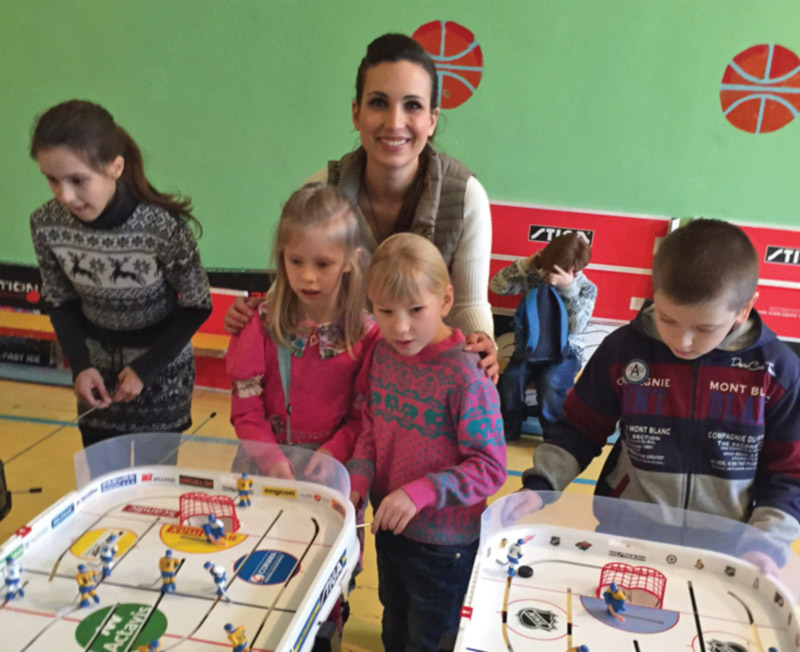
This project, Break the Ice, couples table hockey tournaments with psychosocial support and counseling for internally displaced children suffering from the effects of PTSD. It was inspired by the time Dolinina spent with the CSPS and her sponsoring organization, the National Hockey League.
Dolinina has organized 16 community events in localities throughout Ukraine, serving nearly 600 children and their parents. She continues to send emails and reports of her impact to the CSPS, which maintains a database of the progress of each participant in the Global Sports Mentoring Program.
“They gave me the confidence to believe I could make a difference,” Dolinina says. “I learned that I should believe even the craziest ideas can become true if I try.”
Hoops Continue to Inspire Hope
It is late January 2019, and Hillyer is back in Sulaymaniyah, which is relatively peaceful now. ISIS operatives continue to be arrested and imprisoned in the city, but the threat of bloodshed has mostly been repelled.
Returning to Iraq, where hundreds of girls now play basketball thanks to the groundwork laid more than a decade ago, was always a priority.
“Basketball is empowering the next generation of female leaders here,” Hillyer says.
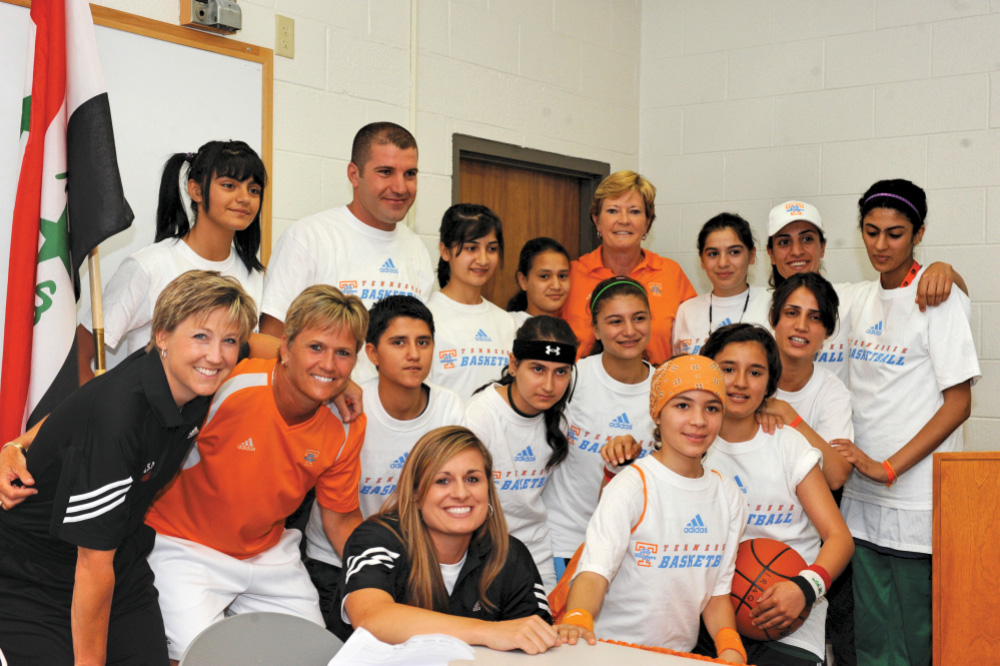
Hillyer spends five days supporting a program launched by a local coach, Rizgar Tawfeeq. The program, Zhima—which translates from Kurdish as “path of life”—consists of community efforts, from building basketball hoops in public parks and spaces to neighborhood tree plantings. But the priority is developing leadership skills for girls and young women through basketball.
Tawfeeq was one of three Iraqi coaches who visited Knoxville in 2009, when Pat Summitt invited a group of girls from Sulaymaniyah to participate in a basketball camp she hosted. From 2007 to 2010, Summitt donated equipment to support women’s basketball in Iraq after learning about the needs from Hillyer.
Their partnership was chronicled in a film, Pat: A Legacy of Love, which debuted at the Bijou Theatre in Knoxville in 2017.
“What Sarah is doing with the Center for Sport, Peace, and Society is really being the ultimate Volunteer,” says Joan Cronan, former longtime UT women’s athletic director, who also was involved in the donations and spent time with the Iraqi girls while they were in Knoxville years ago. “She is taking our values and culture as Volunteers around the world and teaching about what is important to us by using a game that we all love.”
In Sulaymaniyah, more than 200 local girls, ranging from 4 to 20 years old, join Hillyer on the court. They bounce Lady Vol basketballs that have been hand delivered by Hillyer. Some of the girls will participate in the first mother-daughter clinic, which Hillyer will run with Tawfeeq. Others are there to celebrate the annual We Back Pat in Iraq tournament, which has been organized every year since 2011.
They share one thing in common: They all smile. Hope is in the air.
“In a world where we often feel confined by our differences,” Hillyer says, “the CSPS believes sport can be a catalyst for hope, even in the most difficult circumstances. Sport can carry forward peace, equality and inclusion.”
